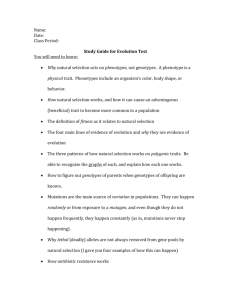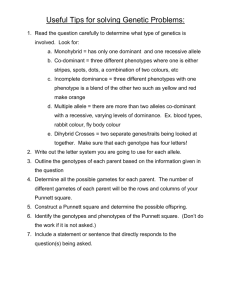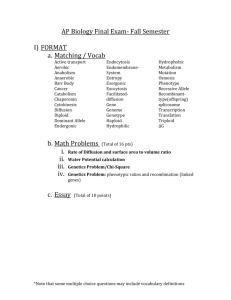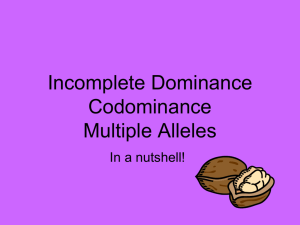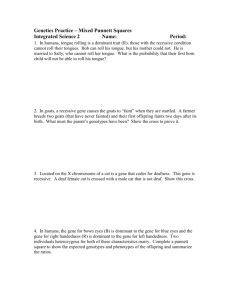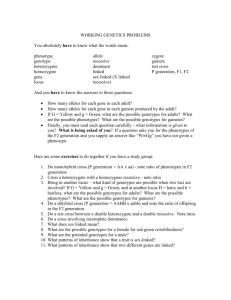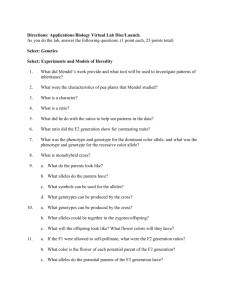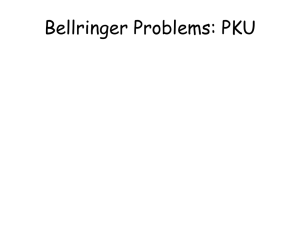Beyond Complete Dominance
advertisement
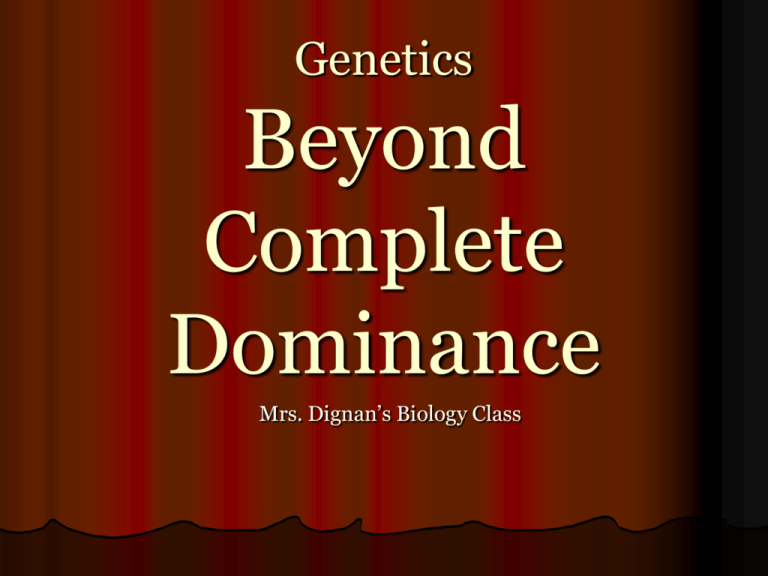
Genetics Beyond Complete Dominance Mrs. Dignan’s Biology Class Complete Dominance One allele is completely dominant over another allele. This the most basic type of genetics problem. Example:Purple flowers are dominant over white. Pp is purple. Problem#1 In pea plants, yellow seeds is dominant over green seeds. Two heterozygotes mate, what are the phenotypes and genotypes of their offspring? Genotypes: 25%YY, 50% Yy, and 25% yy Phenotypes: 75% yellow, 25% green Incomplete Dominance Neither allele is completely dominant. Both alleles BLEND. Example:There are white and red snapdragon flowers. RR is red. WW is white. RW is pink. Problem#2 Flower color (red and white) in snapdragons is controlled by incomplete dominance Two pink snapdragons mate, what are the phenotypes and genotypes of their offspring? Genotypes: 25%RR, 50% RW, and 25% WW Phenotypes: 25% red, 50% pink, 25% white Codominance Both alleles are dominant The alleles don’t blend, but they are both represented in the phenotype. Example:There are white and red cattle colorations. RR is red. WW is white. RW is white and red patches (roan). Problem#3 Fur coloration (red and white) in cattle is controlled by codominance A white cow and a roan (red and white patches) bull mate. What are the phenotypes and genotypes of their offspring? Genotypes: 50%WW, 50% RW Phenotypes: 50% White, 50% roan Multiple alleles Some traits are controlled by more than 2 alleles. Example: Human blood type. Type A and B are codominant. Both alleles are completely dominant over type O. Problem#4 A type AB woman mates with a type O man. What are the phenotypes and genotypes of their offspring? Genotypes: 50%AO, 50% BO Phenotypes: 50% Type A, 50% Type B Problem#5 A type AB woman mates with a type AB man. What are the phenotypes and genotypes of their offspring? What are the chances they will have a Type B daughter? Genotypes: 25%AA, 50% AB, 25% BB Phenotypes: 25% Type A, 50% Type AB, 25% type B 50% female, 50% male ¼*1/2=1/8 (12.5%) Sex-Linked Inheritance Some traits are only found on the X chromosome The y chromosome does not have a copy of those genes because it is so small. Therefore females have 2 copies of those genes and males only have 1. Sex-Linked Inheritance These alleles tend to be recessive. If a boy has an allele for the trait, it shows in his phenotype. A girl would need 2 copies of the recessive allele to show the trait, otherwise she is a carrier (has the allele but it doesn’t show up in her phenotype) Problem#6 A man with normal color vision (XCY)mates with a woman who is a carrier for color blindness(XCXc). What are the phenotypes and genotypes of their offspring? (include genders) Genotypes: 25% XCXC, 25% XCY, 25%XCXc, 25%XcY. Phenotypes: 25% normal female, 25% carrier female, 25% normal male, 25% color blind male. Polygenic Inheritance Many traits are controlled by two or more genes. These genes may be on the same chromosome or on different chromosomes. Ex) Skin color, hair color, eye color, and height Problem #7 Being able to roll your tongue is a trait that exhibits complete dominance over not being able to roll your tongue. Predict the genotypes and phenotypes of a 50% Rr, 50%rr cross between someone 50% can roll tongue, who is heterozygous for 50% can’t roll tongue tongue rolling and someone who can’t roll their tongue. Problem #8 Brown eyes are completely dominant over blue eyes (there’s a separate gene for green and hazel eyes). Predict the genotypes and phenotypes of a cross between someone with blue eyes and someone who is heterozygous for brown eyes. Genotype: 50% Bb, 50% bb Phenotype: 50% brown eyes, 50% blue eyes Problem #9 Harry has blue eyes and can roll his (he is homozygous dominant). Hermione is heterozygous for brown eyes, and can’t roll her tongue. If Harry and Hermione have a baby, what is the probability their baby will have brown eyes and will be able to roll it’s tongue? Dihybrid Cross To find out the probability of inheriting two traits at once, we need to create a larger Punnett square, called a dihybrid cross On each axis, list all possible combinations that each parent could pass on. Dihybrid Crosses measure Compound Probability What are the chances a dice will roll a six? 1/6 What are the chances of rolling two sixes in a row? 1/6 * 1/6= 1/36 You can apply this same premise to calculate the probability of inheriting two traits: What is the probability Harry and Hermione’s child will have brown eyes? 100% or 1 What is the probability Harry and Hermione’s child will be able to roll it’s tongue? 50% or ½ What is 1 times ½? ½ or 50% Pedigrees A pedigree is a diagram the is drawn to show the inheritance of a particular trait. What gender in the pedigree is most affected by the disease? What type of inheritance is this? Pedigree Key Problem#10 Draw a pedigree for the following. Alice and Bob have a two year old son, Charles, who is showing mental retardation, short stature, and cryptorchidism. Alice has two living, unaffected, brothers but her eldest brother died at age 9 and a second brother died aged 10 months. Both had similar problems to Charles. Alice's father, David, who was symptomless, has a sister, Ethel, who has an unaffected boy and girl, and a brother, Fred, who also has two unaffected children. Alice's mother, Gertrude, has two living sisters and had a brother who had died in childhood and who, she remembers, had been mentally retarded. Bob has two brothers, Henry and Ignatius, who are still unmarried. His parents, John and Kate, had tragic lives, both were adopted and never knew their biological parents and both died as the result of a road accident.
